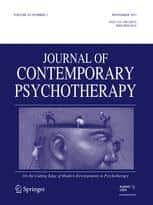The Internet has become a part of most people’s lives in many parts of the world. Since the late 1990s there has been an intensive research activity in which psychological treatments, such as cognitive behavior therapy (CBT), have been found to be effective when delivered via the Internet. Most research studies indicate that the effects are larger when some form of guidance is provided from a therapist, and unguided treatments tend to lead to more dropout and smaller effects. Guided Internet treatments often consists of book length text materials, but can also include other components such as audio files and video clips. Homework assignment is often included and feedback is given for completed homework. Guided Internet-based CBT (iCBT) has been found to work for problems such as depression, panic-, social anxiety-, and generalized anxiety disorders. There are many research trials in which participants have been recruited via media, and there has been less research conducted in representative clinical settings. Most research has been conducted on adults and in university settings with nationwide recruitment. There is a need for treatments and studies on older adults, children and adolescents. In conclusion, dissemination of the research findings on guided iCBT to regular clinical settings is warranted.
Reference:
Andersson, G., Carlbring, P., Ljótsson, B., & Hedman, E. (2013). Guided Internet-based CBT for common mental disorders. Journal of Contemporary Psychotherapy, 43, 223-233.
